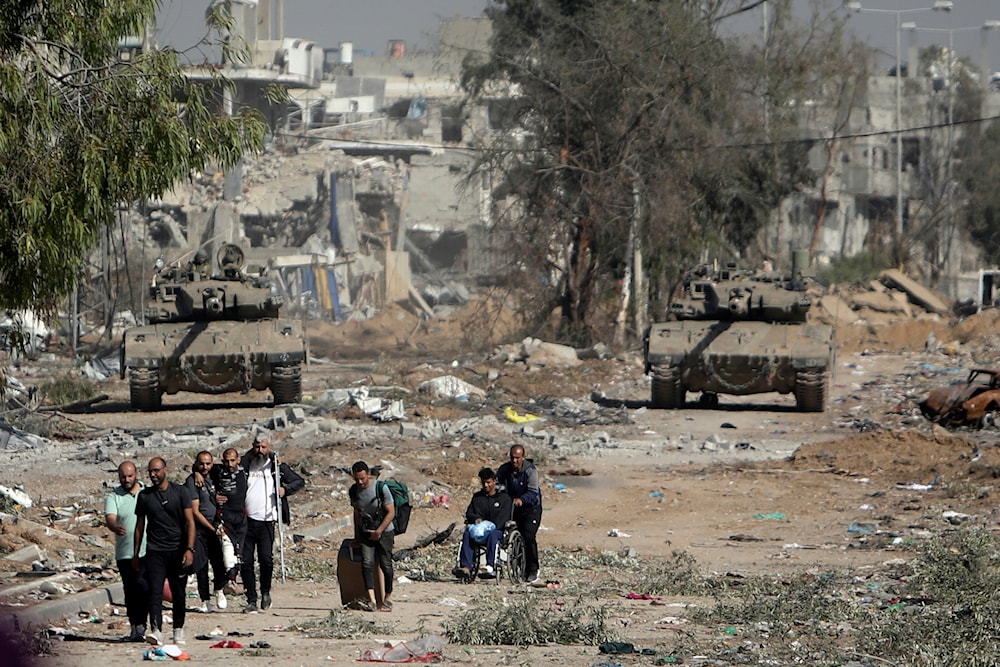Israeli invasion of Rafah strategic mistake, Israeli experts say
Numerous Israeli experts have underlined that the potential invasion of Rafah would be a strategic blunder for the Israeli occupation forces as it would leave them defeated in at least one way.
-

Palestinians flee from northern Gaza as Israeli tanks block the Salah al-Din road in the central Gaza Strip on November 24, 2023 (AP)
Numerous Israeli experts, comprising former military and security officials, have issued stark warnings against an invasion of Rafah, deeming it a terrible strategic mistake were it to take place, as they underline that such a move would culminate in a staggering defeat for the Israeli occupation forces as the Israeli regime appears hellbent on invading the southernmost region of Gaza.
Reserve Major General Yitzhak Brik contends that Israeli leadership's fixation on achieving "absolute victory" over Hamas is a delusion detached from reality. Brik asserts that this misguided pursuit could lead the Israeli occupation into another catastrophic outcome akin to Operation al-Aqsa Flood.
He further criticized what he termed the reckless determination of the political and military leadership to salvage their tarnished reputation at any cost, even if it meant risking the Israeli occupation's security and stability. These "gang members (the political and military leadership) have decided to pay any price to try to salvage their lost honor due to their responsibility and guilt for the grave failure; so much so that they are willing to take actions that amount to gambling on Israel's existence."
Former Israeli occupation forces Central Command Commander Reserve Major General Gadi Shamni underlined that "Israel" needed to swiftly pursue a resolution through negotiations, which would include recognizing Hamas's inevitable dominance in the aftermath of any Israeli withdrawal.
Shamni dismissed the notion of a viable alternative to Hamas and warned against the futility of attempting to confront the Resistance faction militarily.
Strategic ambush awaiting IOF
Another critic of the plan to invade Rafah was Israeli Reserve Major General Israel Ziv, the former chief of the IOF's Operations Division, who warned that Hamas had a strategically devastating ambush awaiting the Israeli occupation forces in Rafah. "It would end with the [IOF] leaving Rafah with its tail between its legs."
He cautioned that any ground operation in Rafah carried unprecedented risks, surpassing previous engagements in the Gaza Strip. He cautions against underestimating the resilience of Hamas and anticipates a scenario where the IOF retreats from Rafah, mirroring past withdrawals that allowed Hamas to consolidate its control.
Former commander of the Israeli Air Defense Force Reserve Brigadier General Zvika Haimovich stressed that there was no definitive victory in such conflicts, urging a pragmatic assessment of achievable objectives in order for the IOF not to get too carried away.
Haimovich highlighted the futility of prolonged military engagements, citing recent precedents where temporary gains were swiftly nullified by subsequent escalations.
No government in 'Israel'
Former IOF Southern Command commander Reserve Major General Yom-Tov Samia accused in an interview with Israeli Channel 13 the Israeli regime of succumbing to anarchic influences, resulting in a protracted stalemate devoid of tangible successes. "There is no government in Israel," he said.
Samia also argued that there has been no success in the last seven months, not militarily, economically, security, politically, or settlement-wise, not to mention "non-existent deterrence," according to Samia.
Former Air Force commander Reserve Major General Eitan Ben Eliyahu wrote an article for Israeli Channel 12 in which he outlined three options in Gaza, a stalemate; a return to all-out combat, which would bear massive casualties for the IOF while also completely undermining the Israeli occupation's image; and coordination with the US, which would require the establishment of a force other than Hamas to rule Gaza.
The former deputy head of the National Security Agency, Eran Etzion, cautions against the mischaracterization of Rafah's significance, urging a reassessment of the Israeli occupation's strategic objectives in the ongoing war on Gaza.
Meanwhile, the former head of the National Security Agency, Reserve Maj. Gen. Uzi Dayan warned of the potential spillover effects of a Rafah invasion, including the risk of Hezbollah extending its operations deeper into occupied Palestine.
Rafah invasion
Israeli Prime Minister Benjamin Netanyahu has since February been saying that the Israeli occupation forces are preparing to enter Rafah, and he does not seem to be heeding any international, especially US warnings, against the matter, as he wants to appear victorious at any expense.
Palestinian Resistance factions affirmed in a joint statement on April 25 that the Resistance is all geared up for any possible scenario in the ongoing Israeli aggression on the Gaza Strip, including a ground invasion of Rafah, the southernmost city in the besieged territory.
In its statement, the factions emphasized that they "will not sit idly by," as "all options [for escalation] are on the table," warning against the catastrophic and humanitarian consequences of any ground aggression on Rafah, which hosts more than 1.4 million displaced Palestinians.
The Palestinian factions held US President Joe Biden's administration and Western governments fully responsible for any Israeli invasion of Rafah, as Western backing to "Israel" is ongoing despite the occupation's violation of multiple international conventions and laws.
In the same context, the factions called on the Palestinian masses in the cities of the West Bank to "rise vehemently" in protest against Israeli threats of invading Rafah.
"We call on our people to turn the West Bank into a fireball in the face of Israeli settlers and soldiers," the statement urged.
Furthermore, the Palestinian factions affirmed that the Israeli genocidal war would not restore the defeated military of the occupation.

 5 Min Read
5 Min Read








